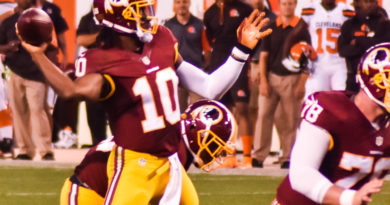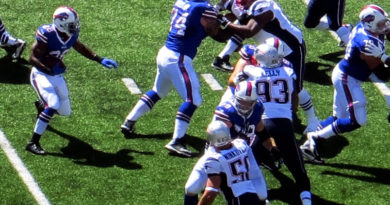If You Think Peyton Manning is a Bad Playoff Quarterback, You’re Wrong; He’s Worse.
To be sure, winning a Super Bowl is extremely impressive. Ask Dan Marino how difficult it is. Marino is in the top handful of names on everyone’s list of “Greatest Quarterbacks of All Time,” but he never got that elusive ring. Peyton Manning has a ring. How he got it (and why he does not have more of them) is a baffling storyline.
Barring injury, Manning is a virtual lock to retire someday with more passing yards and passing touchdowns than any other player who has ever stepped onto an NFL field. His career regular season winning percentage of 70% is almost unfathomable. That is an average of over 11 wins per season. To put that into perspective, only two teams in the last 45 years have missed the playoffs with at least 11 victories.
Great success, however, often leads to great expectations. From 1991-2005, baseball’s Atlanta Braves won 14 straight division titles. That incredibly dominating run, however, yielded only a single World Series title. In fact, the runner-up in the Braves’ division won more championships during that span than the Braves did (the Florida Marlins in 1997 and 2003).
Peyton Manning has been the NFL’s version of the Atlanta Braves. With Manning at quarterback, the Colts won their division seven out of eight years from 2003-2010. The lone year they missed out on the division title during that span, they went 12-4; a record good enough to earn a first-round bye in most seasons. The team averaged a ridiculous 12.3 wins per season during that run and wound up winning a single Super Bowl title.
By now, everyone has heard the knock on Peyton Manning: an inability to have as much success during the postseason as he enjoys during the regular season. In general, quarterbacks often receive too much of the credit for a team’s successes and too much of the blame for a team’s failures. This is a bit unfair, as football is the epitome of a team game, more so than any of the other major sports in this country. Each offensive play requires precise execution by 11 teammates who are asked to block, run routes, pass, catch and run with the ball. That said, no single player in any American sport is more crucial to his team’s success than the quarterback.
The fact that Peyton Manning has been on a playoff team in 13 of his 15 seasons is directly attributable to his immense talent. Through all the players who have blocked for him or caught one of his passes over the years, the one constant was Manning. He is a fixture in the NFL playoffs; the early rounds, anyway.
During his career, Manning has amassed an impressive regular season record of 167-73, but is only 9-11 in the playoffs. While it is certainly true that Manning has faced stiffer competition during the postseason than during the regular season, his Win/Loss Percentage differential is by far the worst of any active NFL quarterback with at least five playoff victories.
| Quarterback | Reg. Season Win % | Playoff Win % | Differential |
| E. Manning | 56.3% | 72.7% | +16.4% |
| J. Flacco | 64.6% | 69.2% | +4.7% |
| B. Roethlisberger | 66.9% | 71.4% | +4.5% |
| D. Brees | 59.5% | 60.0% | +0.5% |
| T. Brady | 77.5% | 70.8% | -6.7% |
| M. Hasselbeck | 52.6% | 45.5% | -7.2% |
| A. Rodgers | 66.7% | 55.6% | -11.1% |
| P. Manning | 69.6% | 45.0% | -24.6% |
That is an incredible decline in winning percentage, particularly given that other than Brady, Manning has played the most playoff games on that list; it is not as though he has a small sample of data. Has Manning been a victim of bad luck for 15 years? Perhaps his defense has consistently underperformed in the playoffs. After all, they are matched up against very good teams in the postseason who likely score a lot of points each game.
The fact is that Manning’s teams have yielded an average of 21.8 points per game in his playoff games, which is nearly a full point per game better than the 22.7 points per game during those same playoffs that every other team averaged. Manning’s offense, on the other hand, has scored 23.0 points per game in the playoffs, just slightly above what the rest of the league was scoring in those postseasons and over four points per game fewer than Manning’s teams had averaged during those regular seasons. It appears the drop in Manning’s teams’ postseason performances can mostly be attributed to the offense.
Of the quarterbacks above, Ben Roethlisberger is the only one with a larger differential between regular season and postseason quarterback rating than Manning (in fact, four of them have a higher quarterback rating in the playoffs than in the regular season). Roethlisberger also is the only one on the list who has a lower percentage of playoff games with a quarterback rating above 100 than Manning. That’s right; Matt Hasselbeck has been more likely to have a game with a rating above 100 in the playoffs than Manning (note that Manning’s career regular season rating is a whopping 17 points higher than Hasselbeck’s).
Manning has gone winless in the playoffs a startling eight out of 12 times. Recall that his teams have averaged over 11 wins per season. So it is not like Manning has been losing games to many superior teams during those early exits. In fact, 20% (four of 20) of the teams in NFL history that failed to win a single playoff game after a regular season with 13 or more victories were quarterbacked by Manning. Read that last sentence again. When looking at active quarterbacks with at least five career postseason games as the favorite, Manning has the worst winning percentage in matchups that his team had been supposed to win.
| Quarterback | Playoff Win % As Favorite |
| B. Roethlisberger | 88.9% |
| M. Hasselbeck | 80.0% |
| T. Brady | 73.7% |
| A. Rodgers | 60.0% |
| D. Brees | 57.1% |
| P. Manning | 46.7% |
Despite all of this, Manning did manage to win a Super Bowl ring following the 2006 season. His supporters point to his championship as proof that he can succeed when it matters most. During that postseason run, the Colts went 4-0 and Manning won the Super Bowl MVP. However, his quarterback ratings during those four games were 71.9, 39.6, 79.1 and 81.8; very mediocre numbers, particularly for someone who puts up the kind of statistics in the regular season that Manning does. The highest of those numbers, 81.8, for the sake of perspective, would have been 24th in the league this past season. He passed for a relatively pedestrian 258.5 yards per game and combined to throw for three touchdowns and seven interceptions in those four games. Not very strong numbers, particularly when you consider that outside of that year, Manning is only 5-11 in the playoffs.
It is difficult to comprehend how such an outstanding player can have such polarizing results. Manning has been plagued by this confounding issue since his college days at the University of Tennessee, where he failed in four tries to defeat his school’s rival, the Florida Gators. The year after Manning graduated, Tennessee beat Florida, ran the table and won the National Championship with a quarterback named Tee Martin…who of course never started an NFL game.
Manning will retire as perhaps the greatest regular season quarterback ever. That is quite an impressive legacy. He will own countless passing records and no one can ever take away his Super Bowl championship, no matter how he performed during that title run. But fans will always wonder if Manning should have won more than that lone Super Bowl. Of the 20 quarterbacks who have the most career playoff starts, he has the second-lowest winning percentage. 53 quarterbacks have won an NFL Championship; Manning is one of only four of them with a losing playoff record and he is the only quarterback to have won a Super Bowl and have a career playoff record below .500 (the other three NFL Championship passers with more postseason losses than wins all won their titles prior to the first Super Bowl). It seems fitting that if he fails to win the Super Bowl this year, Peyton Manning will own yet another record: most career playoff losses in NFL history.



